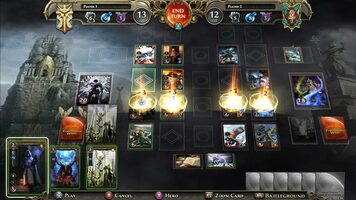
Origins does a much better job, despite being a bit longwinded about it. New-torials - Previous Duels games have been quite poor at explaining how Magic works. The tales of five of the most popular Planeswalkers (Gideon, Chandra, Liliana, Jase and Nissa) are depicted, and never before has a Duels game featured such an excellent tie in, nor such an up to date roster of cards. So much flavour - The Magic multiverse has always had a rich and interesting lore surrounding its cards and their reasons for being, and although it is fairly brief, Origins‘ campaign mode ties in nicely with the flavour of the Magic cards that feature heavily throughout. There is certainly no support for serious constructed play, nor is there support for proper sealed or draft limited event. There is no Planechase, nor are any of the popular paper Magic formats such as EDH or Commander supported. The game also retains the same multiplayer modes it’s always featured, which include One vs One and Two-Headed Giant. Specifically, there are five campaigns, each of which aligns to the story of a key Planeswalker within the Magic multiverse, and there is also the opportunity to fight a one-on-one duel against opponents of three differing levels of challenge. Origins features a very similar set of modes to those which appeared in the past two iterations of the series. And, I might add, everything works just a little bit better than it did last year. Let’s play Magic - Well, you came here to play Magic right? The good news is, you still can. Of course, that same gold can also be acquired using real money, which is where the rub of the so-called free-to-play model will really be tested. From now on, the base application will simply be updated with new sets of cards, and players will earn gold coins with which they can buy boosters. This year, we will bear witness to the culmination of Stainless Games’ creative vision and Wizards of the Coast’s commercial aspirations, as Origins stands to be the last standalone installment in the series. There have been a few missteps (most notably Magic 2014 and Magic 2015) since then, but Stainless Games can generally be applauded for its efforts to move the most welcoming iteration of Magic forward in line with its expanding, more confident user base.

My love for the real life, paper-based trading card game of Magic came about almost entirely because of the first Duels of the Planeswalkers game, so it’s fair to say that I am more than just a little bit biased towards the series.
MAGIC DUELS COINS PC
Additionally, PC and console players can also be randomly paired against human/human teams.Magic: The Gathering has returned to Xbox for the sixth consecutive year in Magic Duels: Origins, but this time around, it’s free to play. No matter which type of teammate you choose, you’ll then face off against another human/AI or AI/AI team. Two-Headed Giant: Pair up with a friend, the AI or a randomly paired teammate in this fan-favorite format. Earn coins for every win against a matched opponent. Versus Battle: Are you ready to take on the world? Take your latest decks into battle against a friend or a randomly matched opponent. This mode offers virtually endless gameplay for new and experienced Magic players alike. Solo Battle: Play against thousands of AI opponent decks! Available both online and offline, you can earn coins with every win as you test and battle with your favorite decks against opponents of varying difficulty. Stop Timer – Certain spells can be cast at any time, even during your opponent’s turn.

Battlefield – The shared zone between players where spells are cast. Game Phase Indicator –Phases occur in this order: Beginning, Main, Combat, Main (again), Ending. When you reduce your opponent to 0 life, you win.

Avatar/Life – Each player starts with 20 life. Hand –Each player starts with seven cards in-hand. Instant and sorcery spells go here when they resolve. Deck/Library – A set of 60 cards filled with Spells and the Land needed to cast them.


 0 kommentar(er)
0 kommentar(er)
